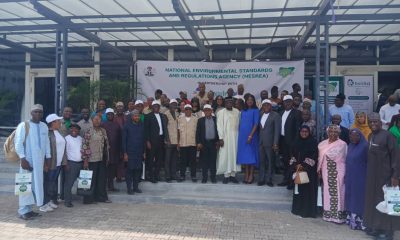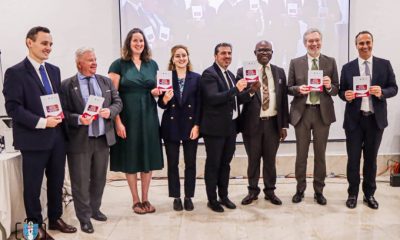POLITICS
Governance Failure Fuels Terrorism, Banditry In Nigeria, Experts Warns

Abuja, Nigeria – A surge in terrorism and banditry across Nigeria is directly linked to failures in governance, particularly at the community level, according to experts gathered at the inaugural meeting of the Community of Practice for Preventing and Countering Violent Extremism (PCVE).
The event, titled the “Inaugural Conference Of A Preventing And Countering Violent Extremism Community Of Practice (PCVE CoP),” focused on the implementation of the PCVE Policy Framework and National Action Plan (PFNAP).
Jaye Gaskia, Chairman of the Partnership Against Violent Extremism Network, framed the issue not as a purely security problem, but as a “governance challenge.”
He stated that “Governance failures lie at the heart of violent extremism in Nigeria,” emphasizing that extremism struggles to thrive in well-governed areas with inclusive representation.
He highlighted the existence of numerous “ungoverned spaces” relying on informal structures like community development associations, lacking formal authority. Gaskia advocated for empowering these local institutions to bridge governance gaps and foster sustainable solutions, stressing the need for community-led initiatives.
These sentiments were echoed by Major General Adamu Laka, National Coordinator of the National Counter Terrorism Centre (represented by Commodore Ahmed Abubakarr Madaki), who emphasised the importance of youth and women-focused programs like the Young Peacebuilders Network.
While acknowledging successes in capacity-building for law enforcement and community leaders, he pointed to ongoing challenges like limited resources, socioeconomic inequalities, and the exploitation of digital platforms by extremist groups.
He stressed the crucial role of grassroots ownership through participatory planning and budgeting, along with strengthened collaboration with international organizations and the private sector.
The alarming statistic of N2.3 trillion paid in ransom within a year, revealed by the National Bureau of Statistics (NBS), was highlighted by Yetunde Adegoke, National Coordinator of the Global Community Engagement and Resilience Fund.
She described the situation as alarming but noted government awareness and plans to scale up community resilience programs.
Adegoke stressed the importance of “non-kinetic” approaches, including reintegration programs for surrendered insurgents.
Suwaiba Dankabo, Deputy Country Director of ActionAid Nigeria, underscored the necessity of consistent evaluation of peacebuilding strategies, urging reflection on past successes and failures to effectively address the root causes of violence.
The consensus among participants was that a multifaceted approach, addressing governance failures at the community level and fostering inclusive, locally-driven solutions, is critical to combating the growing threat of terrorism and banditry in Nigeria.
-
CRIME4 years ago
PSC Dismisses DCP Abba Kyari, To Be Prosecuted Over Alleged $1.1m Fraud
-
FEATURED4 years ago
2022 Will Brighten Possibility Of Osinbajo Presidency, Says TPP
-
FEATURED2 years ago
Buhari’s Ministers, CEOs Should Be Held Accountable Along With Emefiele, Says Timi Frank
-
BUSINESS & ECONOMY2 years ago
Oyedemi Reigns As 2023’s Real Estate Humanitarian Of The Year
-
SPORTS2 years ago
BREAKING: Jürgen Klopp Quits Liverpool As Manager At End Of Season
-
SPORTS2 years ago
Could Liverpool Afford Kylian Mbappe For €200 million? Wages, Transfer Fee
-
ENTERTAINMENT2 years ago
Veteran Nigerian Musician, Basil Akalonu Dies At 72
-
FEATURED2 years ago
Tribunal Judgement: Peter Obi Warns Of Vanishing Electoral Jurisprudence, Heads To Supreme Court
-
BUSINESS & ECONOMY2 years ago
Oyedemi Bags ‘Next Bulls Award’ As BusinessDay Celebrates Top 25 CEOs/ Business Leaders
-
FEATURED4 years ago
2023 Presidency: South East PDP Aspirants Unite, Demand Party Ticket For Zone



































